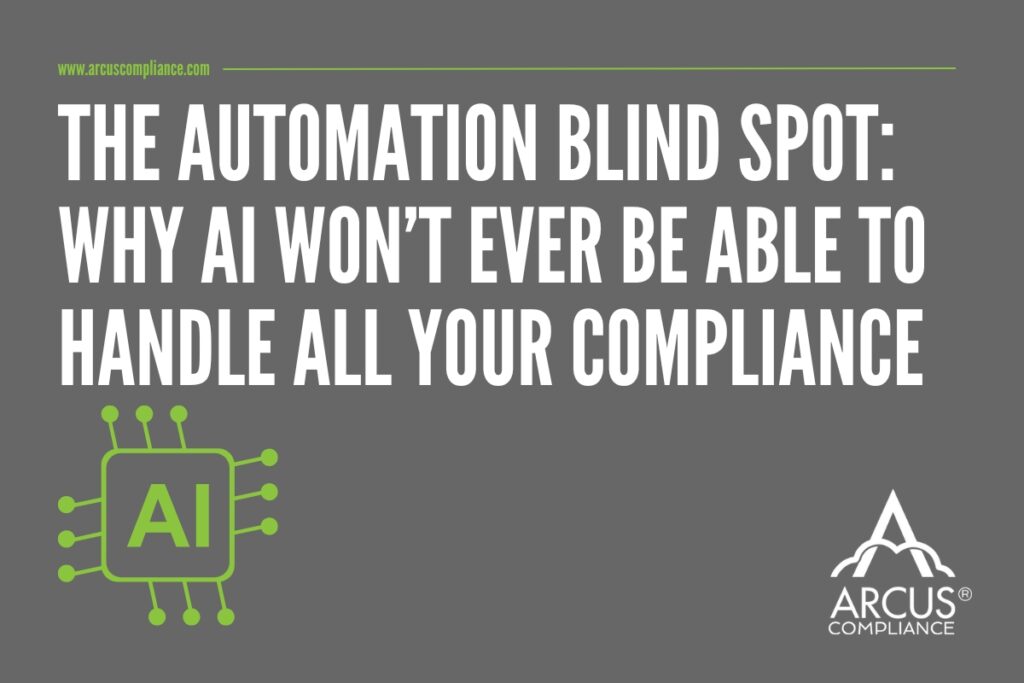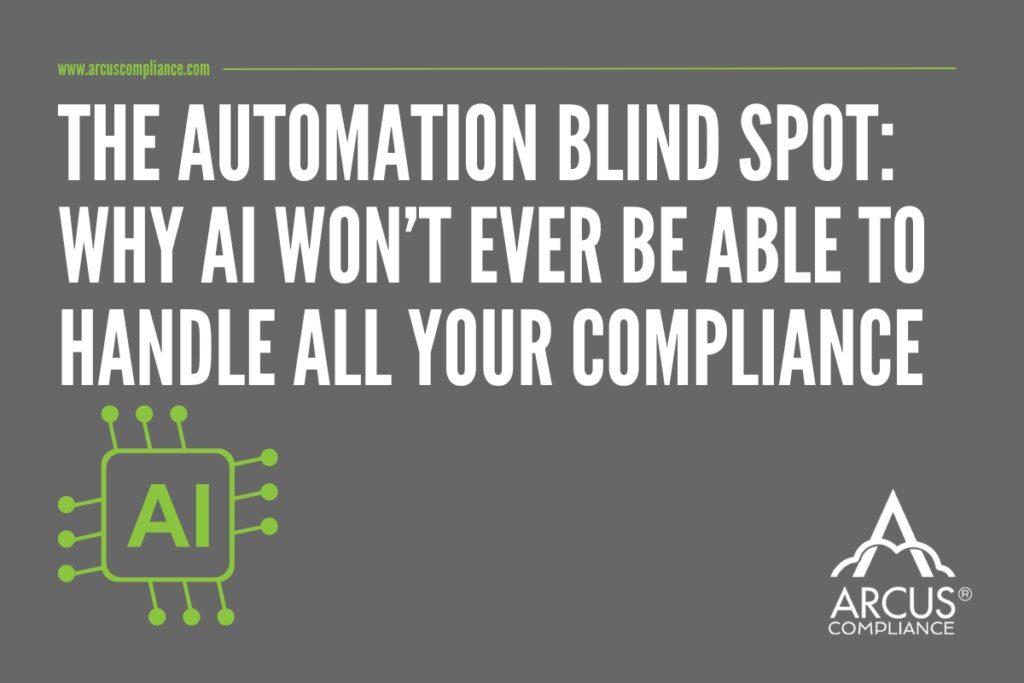
Is AI really coming for everything?
That’s the mantra echoing across boardrooms and LinkedIn posts right now. AI drafts contracts, analyses trends, even writes your marketing campaigns before you’ve had your first coffee.
But let’s pause and challenge the hype.
When it comes to regulatory compliance – one of the most nuanced, political, and high-stakes areas of business- the idea that AI can handle everything isn’t just naive. It’s dangerous.
✅ AI will tell you what the law says
❌ It won’t tell you how the law moves
And that difference could be the line between scaling safely… and watching your brand get buried by regulators, competitors, or both.
The seduction of AI (and why it fails founders)
You didn’t build your business because you love compliance. You’re a creator, a builder, a disruptor.
So when AI promises to simplify all that? It’s tempting.
- “We can automate compliance workflows.”
- “Just feed your regulations into the system and get instant answers.”
- “No need for expensive consultants anymore.”
On the surface, it sounds like a dream come true.
But here’s the problem: AI is brilliant at processing information. It’s awful at interpreting context, nuance, and human politics, which is exactly where compliance lives.
Field medics, brain surgeons, and founder-friendly compliance
Think of compliance like medicine.
AI is like a first-aid app. It’s perfect for surface-level, repetitive tasks. If you’ve got a papercut, it’ll tell you how to clean and dress it.
But running a business in a regulated industry? That’s not a papercut. That’s brain surgery on a moving patient.
Big compliance firms know this. That’s why they charge multinationals millions for vast teams of lawyers, analysts, and bureaucrats to create risk-averse systems. They don’t care about speed. They care about making sure no one in the boardroom gets fired.
Small, founder-led brands? They don’t have that luxury.
AI offers cookie-cutter compliance systems designed for corporate giants: rigid, bloated, and built for businesses that move at a snail’s pace. Founders trying to use these frameworks will either:
⚠️ Burn through cash they don’t have
⚠️ Or cut corners, hoping no one notices until they’ve scaled
Neither approach works.
What you really need isn’t an AI bot or a bloated corporate compliance machine.
You need a consultant.
Someone who sees the wider picture. Someone who knows the regulator’s patterns, anticipates their next move, and helps you outfox them without breaking the rules.
That’s where Arcus comes in.
The Automation Blind Spot
AI can interpret regulations. It can churn out summaries and answer your questions with impressive confidence.
But compliance isn’t static. It’s a moving target.
Regulators shift focus constantly. Loopholes close overnight. Enforcement priorities change not because of data, but because of politics, public perception, and pressure.
AI might know the rules. But only someone who’s been in the arena knows the winning moves.
The Harmonised Trap: why AI misses what consultants see
Here’s a real-world scenario that trips up founders all the time:
Founder A, let’s call her Sophie, uses AI to create a compliance plan for her new product. The AI does an impressive job; it parses the harmonised EU regulation and spits out a beautiful, orderly plan. Sophie feels confident and launches headlong into production, convinced she’s covered every base.
But here’s the problem: the AI’s advice was based on the “harmonised” version of the regulation. It didn’t account for the local nuances and member state interpretations, the areas where enforcement agencies apply their own flavour of the rules. In one country, authorities interpret a clause more strictly than the EU guidance suggests. At the border, Sophie’s shipment is stopped by customs and held up for months. Suddenly, her compliance plan isn’t worth the paper it was printed on, and her launch timeline is in tatters.
Now compare that to:
Founder B works with a consultant who knows the regulation inside-out and understands the grey zones in different member states. The consultant flags the potential local issue, recommends an adjustment to the packaging and documentation, and Founder B’s shipment sails through without a hitch.
This is where the Arcus hive mind comes in.
Even if you’re a multinational brand managing your own compliance, you’re limited to your own experience. You only see what happens to your products.
At Arcus, we work across 50 to 100 retained clients and more than 300 ad-hoc clients in multiple regulated industries. That means:
- We see enforcement trends, issues, and regulator behaviour before they hit the headlines.
- We know which member states are stricter, which are under political pressure, and where the grey areas are turning black-and-white.
- We can apply lessons from one industry to another in real-time.
When you’re doing your own compliance, you’re gambling on your single perspective.
When you work with a consultant like Arcus, you’re tapping into a hive mind of intelligence 50x or 100x larger than yours.
The danger of over-reliance on AI in compliance
AI absolutely has a place in compliance.
It’s brilliant for repetitive, rule-based tasks:
- Crunching vast technical documents
- Checking for inconsistencies in files
- Generating first drafts of standard materials
But the danger comes when founders treat AI as a replacement for human-driven strategy rather than a tool to support them.
AI can’t:
- Spot where regulators are quietly shifting focus
- Predict which loopholes are about to close
- Or weigh up the risk/reward trade-offs founders face every day
Compliance isn’t a game of checkboxes. It’s a strategic discipline.
Over-reliance on AI creates a false sense of security. It’s the equivalent of plugging your symptoms into a health app and assuming you don’t need a doctor.
Compliance as a weapon for founders
The businesses that assume compliance can be automated will be overtaken by those that use compliance as a weapon – a tool for faster scaling, stronger brands, and regulator-proof growth.
If you’re a founder in a regulated space and you think compliance is just a box to tick, you’re already behind.
The winners are the ones treating it like a boardroom strategy, not an admin function.
At Arcus, we’ve seen this firsthand. We’ve helped brands pivot their compliance from a cost centre into a competitive advantage:
- Faster launches
- Stronger supply chains
- And a lot less time spent worrying about what the regulator might do next
✅ AI might know the rules. But only someone who’s been in the game knows the winning moves.
️Founders: want to see the blind spots in your compliance strategy before the regulator does? Let’s talk.
Why not take our free compliance assessment ARC Methodology scorecard to benchmark your current status? It takes 4-5 minutes and we’ll send you a free 25+ page bespoke report highlighting your current weaknesses and a roadmap for improvement. Alternatively, if you already know what needs improving, why not book a call to discuss our “Compliance Needs Analysis” (CNA) to deep-dive into your regulatory needs and build rapid improvements in Agile systems, Risk-based approach and a Compliance culture.

